This story appears in the May issue of VICE magazine. Click HERE to subscribe.
Tedy Ursuleanu has been having trouble with her neighbor. The fire took most of her fingers—along with many other things—and she sometimes drops plates on the floor, upsetting the elderly woman in the apartment downstairs. On the frigid evening of October 30, 2015, Ursuleanu had gone to the band Goodbye to Gravity’s record-release party at Colectiv, a club in an old factory on an industrial block in central Bucharest. “It was known as one of the safer clubs,” she told me. At the end of the show, a fire broke out. Like many clubs and bars in Bucharest, it had skirted through the permitting process with handshakes and informal payments. It also hadn’t been inspected, was overcapacity, and had only a single exit. The fire overtook Ursuleanu and she passed out, but when she woke up, she managed to get outside to an ambulance. Twenty-seven attendees couldn’t escape and died. Despite superior medical facilities nearby in Western Europe, Romanian authorities chose to treat most of the victims within the country. As a result, 37 more people died in Romania’s underprepared hospitals, many from infection.
Videos by VICE
In a country that has been, relatively speaking, free of tragedy since the 1989 Romanian Revolution, the Colectiv fire was seen as an unmitigated and preventable disaster. “It was a tragedy beyond the numbers, and it revealed something very deep,” longtime Bucharest activist Alexandru Alexe told me when I visited in March. “The politicians had blood on their hands.” The fire catalyzed latent rage at pervasive corruption within the Romanian system—critics and survivors blamed the bought-off fire inspectors, the club owners, the underprepared and bribery-fueled medical system, and the corrupt politicians. As Ursuleanu lay unconscious in the week after the fire, her mother speaking words onto her lips in an attempt to communicate, large militant protests shook Bucharest—under the banner CORRUPTION KILLS!—forcing the resignation of the center-left Social Democratic (PSD) government of Prime Minister Victor Ponta. Months earlier, Ponta had been indicted on charges of fraud, tax evasion, and money laundering.
Ursuleanu was one of the lucky few burn victims who got sent abroad and survived. She spent the better part of three months unconscious in a Viennese hospital. In the summer of 2016, a bombshell investigation by journalist Catalin Tolontan uncovered that the company that supplied Romania’s hospitals with sterilization fluid, Hexi Pharma, had for a decade been supplying a diluted product, the equivalent of dish soap, resulting in an untold number of preventable deaths. It was yet another example of the backhanded dealing that infuriates average Romanians. “That investigation was our Spotlight,” another Romanian journalist told me. The company’s CEO died in a car crash the night before prosecutors were supposed to question him, fueling suspicions of corruption at a higher level.

On October 30, 2015, a fire broke out at the Colectiv nightclub, killing 64 people and injuring 147. Tedy Ursuleanu, pictured here, lost her fingers in the fire and later became a participant in protests in University Square against the emergency decree from the Social Democratic Party (PSD). Photos by Andrei Pungovschi
In December 2016, the PSD returned to power on a platform of modest wage and welfare benefits coupled with family-values conservativism, garnering substantial electoral margins from its vast town and country political machine. With the disgraced Victor Ponta under indictment, and party leader Liviu Dragnea facing jail time for his second set of corruption and influence-peddling charges, a pliable young functionary named Sorin Grindeanu was installed as prime minister.
“There are seven different ways to say ‘bribe’ in Romanian. Romanians pay bribes from the moment they are born to the moment they die,” reporter Mihai Radu told me. “When a baby is born, you give the doctor 1,000 euros if you want it done right. When you die, you pay the cemetery for six guys to dig a hole, and the guys say, ‘Give us some money; if you don’t give us money, the hole will be badly dug, and the coffin will go in crooked.’” When Ursuleanu returned to Bucharest after her lengthy convalescence, she began to get active in politics, organize with her friends, and petition against the mayor and the PSD. Shortly after the PSD government took power, at 10 PM on January 31, texts began to pour in from Ursuleanu’s friends. Under the pretext of clearing the overcrowded prisons, the PSD had passed an emergency decree paving the way for amnesty for hundreds of politicians and CEOs across the country who had been indicted and imprisoned for corruption. The decree decriminalized all “abuse of power” charges—political or corporate—up to about $47,000. The law was custom-made for Dragnea, one of the most powerful men in Romania, who badly wanted to be prime minister.
Minutes after hearing the news, Ursuleanu and her friends rushed out to Victory Square, a huge asphalt diamond in front of Romania’s main government building. Hundreds of people came out from the surrounding apartments, screaming mad. In a couple of hours, the numbers swelled past 15,000, and thousands also took to the streets of Romania’s other major cities: Cluj, Iasi, Timisoara, and Constanta.
In the nights that followed, the largest and most widespread demonstrations since the fall of Communism convulsed Romania. “Romanians are slow to get angry, but when they get angry, they get really angry,” I overheard one protester say. The crowds grew spontaneously, fueled by Facebook and groups of friends. Night after night in the blowing snow, amid the roar of vuvuzuela horns, hundreds of thousands held Victory Square. “Thieves!” they chanted. “Resign!” With fireworks flying at the gendarmerie, it looked like Ukraine’s Euromaidan Revolution, reloaded.
Sorin Cucerai, a libertarian philosopher who was active in the 1989 revolution, told me that the recent protests were deeper and more substantial than those 27 years ago. Thousands rallied in second-tier cities and rural municipalities, practically unheard of in a country where political apathy has become the norm. The distrust of the Political Establishment went so deep that even after the protesters forced the repeal of the emergency decree and the resignation of the justice minister, Florin Iordache, 500,000 stayed in the streets. Victory Square turned into a kind of democratic centrifuge, replacing work, bars, brunch, and home. Ursuleanu celebrated her 30th birthday there.
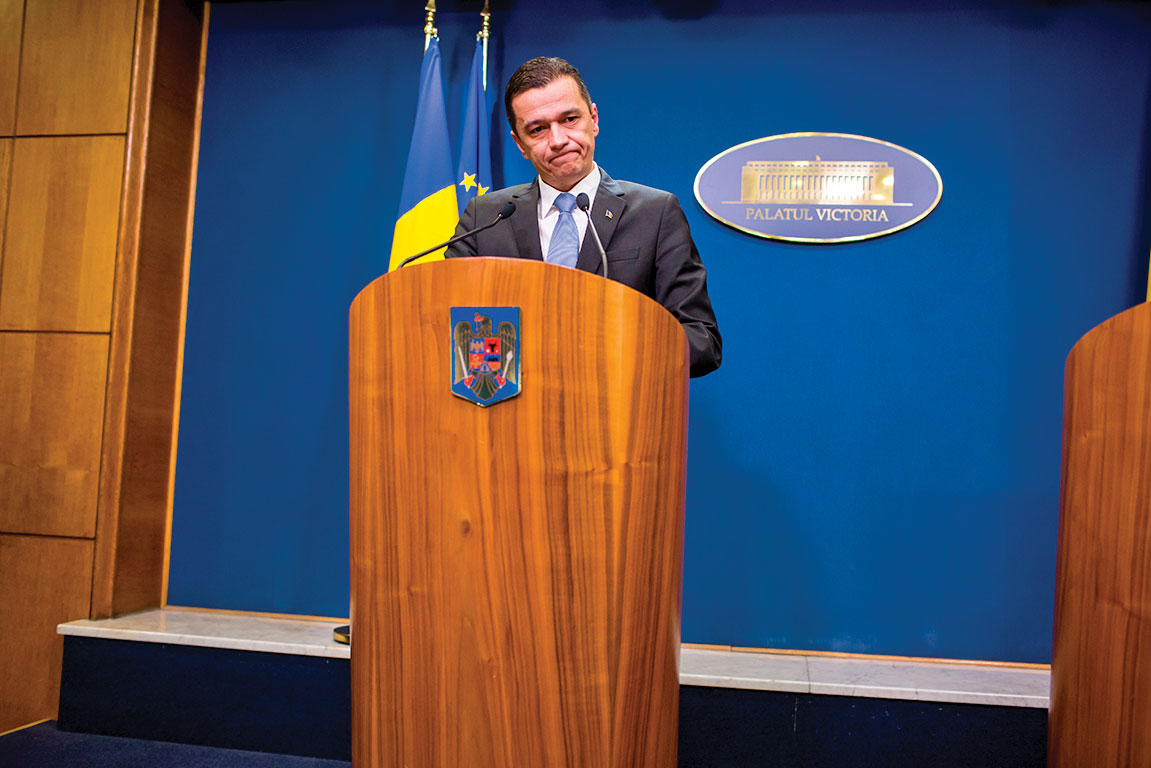
Current Romanian prime minister Sorin Grindeanu
I arrived in Bucharest on the 20th straight night of protests. Having won the battle but not the war, things were in a lull, with numbers diminished. About 600 people stood in the cold drizzle waving Romanian flags and pointing laser projections reading REZIST! on surrounding skyscrapers. I spoke to an enraged middle-aged woman who was sick of bribing and said her mother had died in the hospital from unsterilized surgical equipment. “They steal and steal, that’s all they do, they steal right in front of our faces.” As I spoke to other people, it seemed that what angered them most wasn’t the actual substance of the emergency decree but the brazen, self-serving nature of it. They felt it insulted their dignity and intelligence. Over and over, I heard, “They fuck us right in our faces,” and, “They piss all over us.” Everyone seemed to be waiting for the PSD government to make the next move.
Bucharest is a sprawling mess of a city. Until recently, its reputation was as the gutter of Eastern Europe, infamous for its packs of wild dogs, most of which were gathered up and put to death starting in 2013, after a young boy and a Japanese tourist were killed. In the 1930s, British travel writer Patrick Leigh Fermor described the city as a “fascinating nightmare” of “ferro-concrete facades,” and that description largely holds up today. It is a tangled palette of grays with 24-hour funeral parlors, wrought iron, and tired morning smokers mixed with abandoned tin-roofed Second Empire architectural gems and pigeons peeking out of Art Nouveau attic windows. On the main boulevards, it is Pyongyang with empty Armani stores. The winding, narrow side streets smell of wood smoke and essential oils and hide cool little hipster bars filled with the intelligentsia.
When I met Ursuleanu at her apartment, she was with her friend and fellow Colectiv survivor Mihai Grecea, a jolly filmmaker who lived through the fire thanks to a Hail Mary artificial-lung treatment and whose hands remained taped up to conceal his burns. Ursuleanu wore a T-shirt that read BEST AND WORST CASE SCENARIO and showed me the Goodbye to Gravity lyrics she had gotten tattooed over the antibiotic port on her chest. I asked her who could be blamed for the fire, which seemed to me to be more a result of a corrupt and inefficient regulatory system than any particular malevolent actor.
“There are so many to blame,” she said. She recalled having once been asked to forge permits for luxury construction projects when she worked in an architecture firm. “I’m to blame also, because I saw so many things and did nothing.”
I asked Grecea what he thought of the present situation. “My political beliefs are,” he trailed off, sighing, “very strong.” Ursuleanu interjected with a laugh.
“I think we need a strong party made up of people from the square,” Grecea said. “Supposing the PSD wasn’t in power anymore, what would we put in its place? We have no real alternative, especially on the left. There was a small party born last year called Union to Save Romania [USR], but they don’t have any ideology. They are a very pragmatic party, almost as if they’re trying to debug Romania. They have a lot to learn before they become politicians.”
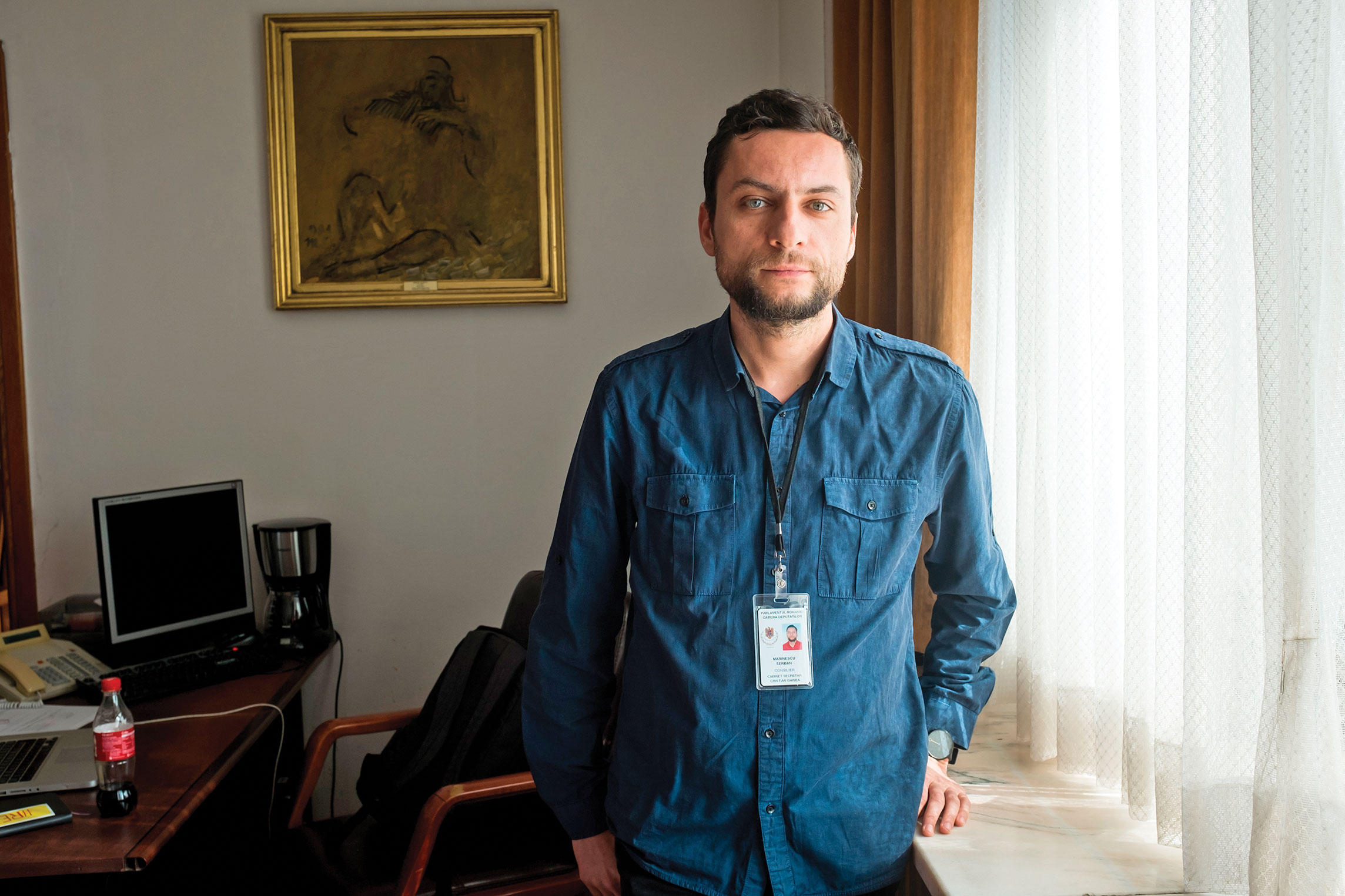
Șerban Marinescu got his start in politics as an anti-corruption protester in University Square. He’s now a member of the Romanian parliament for the newly formed Union to Save Romania Party, created in the wake of the Colectiv fire.
Last December, the USR, a fresh, urbane anti-corruption coalition, made a bid in the national elections and to everyone’s surprise—including its own—garnered nearly 10 percent of the vote, becoming the third-largest party in Romania. The singularly bleak and brutal rule of Communist Nicolae Ceausescu, which ended with his and his wife Elena’s execution in 1989, has left many 21st-century Romanians with a long list of prejudices: Most of the people I met were opposed to socialism, nationalism, Russia, formal political parties, politics, and politicians. Paradoxically, many spoke admiringly of Bernie Sanders. Beneath the explicit reasons for each new political mobilization lies a bottomless well of anger at the country’s entrenched Political Establishment, represented by the two major parties, the PSD and the opposition National Liberal Party, both of which emerged from the wreckage of the hated Romanian Communist Party. Originally started as a Bucharest historical-preservation coalition, the USR simply capitalized on this underlying frequency, running on the slogan “We Are Not Politicians.”
On the smoky back patio of a dive bar, I met a leading member of USR’s parliamentary staff, a handsome, clear-eyed 37-year-old architect named Serban Marinescu. During the elections, Marinescu had waged a dark-horse bid to unseat Dragnea from his home territory in Teleorman County, one of the poorest regions of the country. He lost badly. Door-to-door crowd-funded campaigns are simply not done in Romania, and Teleorman is known as “captive” PSD territory—businesses, real estate, and contracts administered by a Dragnea-loyal political machine that runs it like a company town. “All the administration is PSD, all the businesses are PSD. The CEO of the company is a guy from PSD and will tell you straight up, ‘If I see you at a protest, I’ll fire you.’ It’s not very subtle,” Marinescu said, smoking and tossing back another pint.
Culturally speaking, Marinescu—who immediately reads as a Bucharest cosmopolitan—running in Teleorman was the equivalent of a Brooklyn hipster running in rural South Carolina, maybe even more tone deaf. An awkward video from the campaign shows him attempting to get out the vote among grizzled, Soviet-era locals and being laughed out of town. “Buy us something! Buy us a meal!” a group of sooty men ask. “We’re not like that, we don’t have money, we’re poor and young,” Marinescu pleads. “Come on, give us 10 lei for a beer,” they laugh. “Really, we don’t have money, but we want you to vote for us. USR doesn’t have an elitist message; it has a populist message,” he says. In another scene, he ignores a man asking him to reduce taxes.
“The attitude there is: Yeah, we know Dragnea steals, but he steals for us too,” Marinescu said bitterly. I asked him if the USR has any ideology or guiding principles. He seemed somewhat annoyed by the question, describing it glibly as a “pro-European liberal party, liberal free market blah, blah economics with left-wing social policies, pro-minority, pro-gay.” He added: “It’s not like you have a real leftist party and real right party here, just some thieves that use politics for their own interests and make statements that don’t really matter. You can’t fight [them] ideologically because they don’t believe in what they say.” I asked him what he had hoped to accomplish if he knew he wasn’t going to win. “What we can do now is take out of the closets the people who are already against Dragnea… The reason they don’t speak up is they feel like we felt ten years ago, like they’re alone. That was the purpose of our campaign: Just speak up, and nothing will happen to you.”
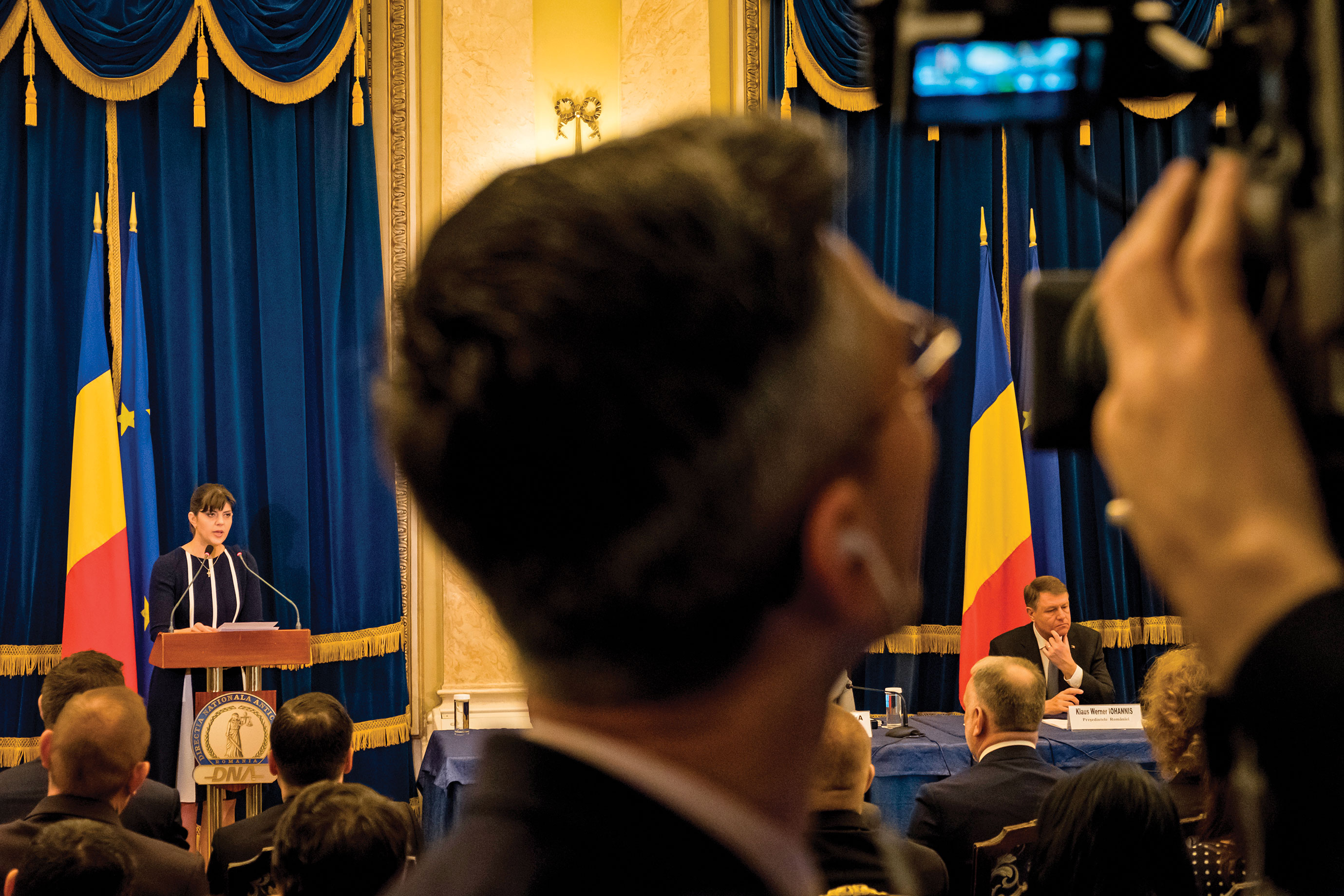
Laura Kövesi, head prosecutor of the National Anticorruption Directorate, has emerged as a crusader against government malfeasance.
Marinescu knew this from personal experience. Ten years ago, the Bucharest police savagely beat him after a dispute with a cab driver. His court case got drawn out for eight years and wasn’t settled until he took it to the European Court of Human Rights, which ruled in his favor and awarded him about $8,000 in damages. His other transformational experience with the system occurred in 2013, when he and some colleagues won an architectural cash prize to redesign the central plaza of the city of Râmnicu Vâlcea. The town’s mayor began calling up at night, asking to meet at a coffee shop, seeming to want a cut of the money. “We Romanians, we know this shit, when mayors start acting strange, you know what’s going to happen,” Marinescu said, laughing. Although his friends advised against it, and it was considered risky to do so, he participated in a sting, landing the mayor a four-year prison sentence.
Romania’s National Anticorruption Directorate, better known as the DNA, helped arrange the sting. The unusually independent prosecutorial body was established in 2003 during the country’s preparations for accession to the EU but didn’t grow any teeth until the past few years. During the accession process, Romania began overhauling its judiciary, teaching a new generation of lawyers the requisite democratic principles from the West.
Vlad the Impaler, the 15th-century warlord better known as Dracula, remains a potent political symbol for Romanians for his brutal persecution of the corrupt ruling class and thieves. The most recent incarnation of this cleansing angel is Laura Kövesi, a former competitive basketball player and now chief prosecutor of the DNA. Under Kövesi, the DNA has become a waking nightmare for the country’s rich and powerful, as thousands of politicians, oligarchs, CEOs, and moguls are dragged in and indicted. On sunny days, a paparazzi-like gaggle of journalists stand by the DNA’s side entrance, waiting to see which politicians will be taken in handcuffs for questioning. Kövesi has been unafraid to go after the highest authorities in Romania, including a former prime minister, Adrian Nastase, who attempted suicide as police closed in on him. Now it’s clear the DNA is once again coming for Dragnea.

Romanian president Klaus Iohannis
One bright morning, I attended the DNA’s annual press conference in the neoclassical Palace of the National Military Circle. Past the TV cameramen hoping to snag an interview with Kövesi, a boatload of smiling prosecutors waited to shake attendees’ hands. In an opulent marble hall filled with diplomats, military officials, and opposition politicians, Kövesi—who looked like she could be a fourth member of Sleater-Kinney aside from the haunted circles around her eyes—delivered a deadpan report on the years’ quarry, a staggering 1,270 indictments: three ministers, six senators, 11 MPs, 47 mayors, 16 magistrates, in cases worth $275 million altogether.
President Klaus Iohannis, formerly of the National Liberal Party and who has allied himself with the anti-corruption protest movement, applauded the directorate’s work and declared that the fight against corruption would continue “full steam ahead.” Of course, as a result of their work the DNA, Kövesi and Iohannis have been subjected to every manner of attack. Some claim (without evidence) that they are the new Securitate, Ceausescu’s vicious secret police. This past December, as nationalist media mogul Sebastian Ghita fled his judicial detention and went on the lam from INTERPOL, the television station he owns, RTV, was turned into an anti-Kövesi network, broadcasting allegations that she was a CIA agent. RTV also claimed she was in collusion with the secret police and had plagiarized her PhD thesis.
“The politicians turn into little bitches when they’re put in a little pre-trial detention for 20 to 70 days,” the activist Alexe told me. “Do I really have to do 12 to 20 years? Yes, you do. The average Romanian wants many, many years in jail for the big fish. They want the confiscation of fortune.”
One controversial chant that has taken hold at Victory Square goes: “DNA—come and take the bastards away!” Looking around the Palace of the National Military Circle, bounded by marble carvings of Greek gods, the military and party officials seemed composed and relaxed. But I wondered how many of them were inwardly panicking, thinking if they might be next.
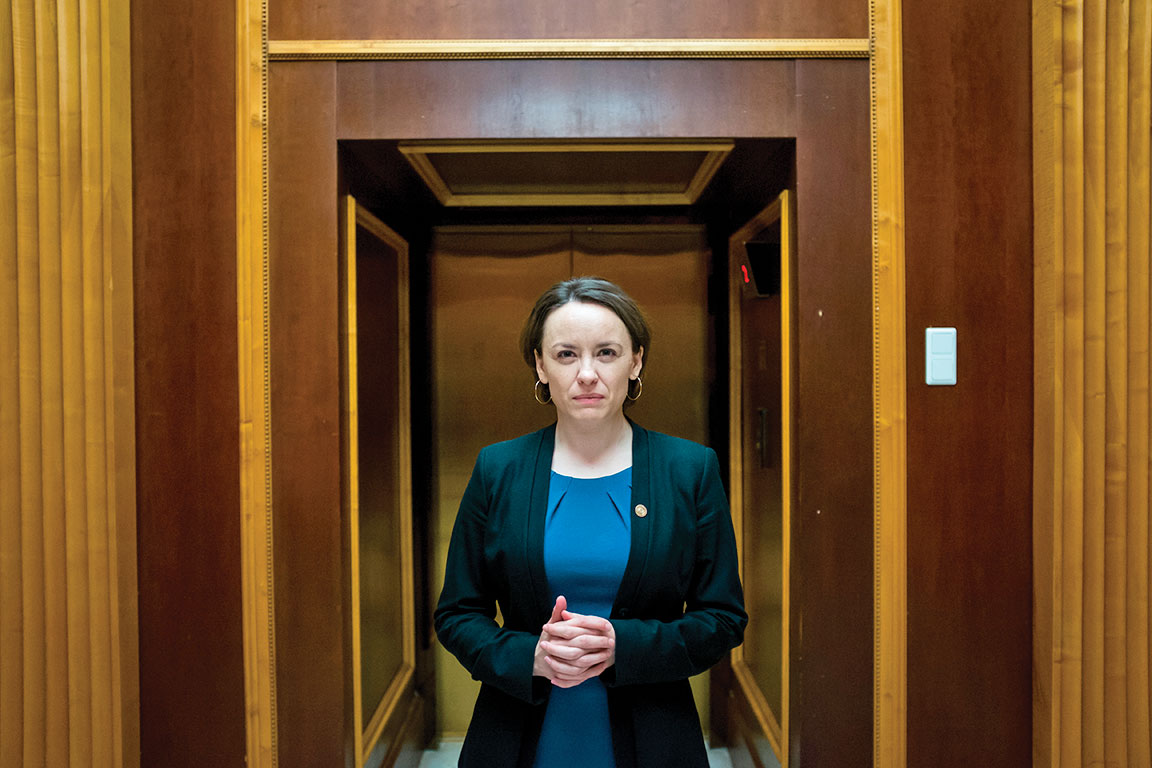
Colette Chichirau, a member of the Romanian parliament from the USR
Marinescu invited me to join him at the USR offices at the Palace of Parliament, a monumental structure that takes up an entire neighborhood of Bucharest. Inspired by a trip to North Korea, Ceausescu began the building in 1984 but didn’t live to see it completed. Today the Coptic monolith remains among the largest administrative buildings in the world, a marble shrine to power. Inside, empty football-field-length halls of red carpet and chandeliers rolled past busts and paintings of mustachioed Romanian heroes. At the end of each darkening hall was a grim buffet, with lunch ladies pushing meat and potatoes—”More? More?”—on the smirking politicians.
The USR members had been given an oak-paneled wing in the Escher-like maze and still seemed a bit in awe of their official authority, like interns who had been given the keys to the executive suite. I asked Marinescu how the transition had been from civil society to the corridors of power. He winced a little bit and whispered, “Well, once we started protesting… you could really feel the difference.” At USR’s roundtable, young attractive assistants buzzed about with a little I’m important! pep in their step. “Just think about it. We’re members of parliament,” the 39-year-old MP Cosette Chichirau told me, her eyes glittering. Chichirau came back to Romania from the United States just last year. Having finished her PhD at UMass Amherst and worked for some years in finance, she had been one of the early donors and campaigners for Bernie Sanders. After he lost the Democratic primary, she was seized with a desire to run for office, so she moved home and ran a crowd-funded, Bernie-style campaign on a platform of fixing the political system and won her hometown of Iasi, one of Romania’s largest cities.
The night the emergency decree was passed, Chichirau ran to the government building hoping to do something, anything, to stop her colleagues, but she wasn’t able to get in. She went with the other USR representatives to the square. As the movement swelled, USR assumed the role of advocate for the street protesters. They hounded Dragnea and the PSD officials inside the Palace of Parliament, leading to scoldings that they weren’t behaving like politicians. In the hallway outside the USR chamber, Chichirau reenacted how she and a crowd had cornered Dragnea, shouting at him as he tried to escape to a silver elevator. “They thought this was a safe place. Now they have no place to hide,” she said. “Some of them can’t admit we’re colleagues. They say, ‘Some citizens came after us.’ They wish they could kick us out because their first thought was: These citizens shouldn’t be here. Can you imagine Congress people doing this kind of thing in the United States?“
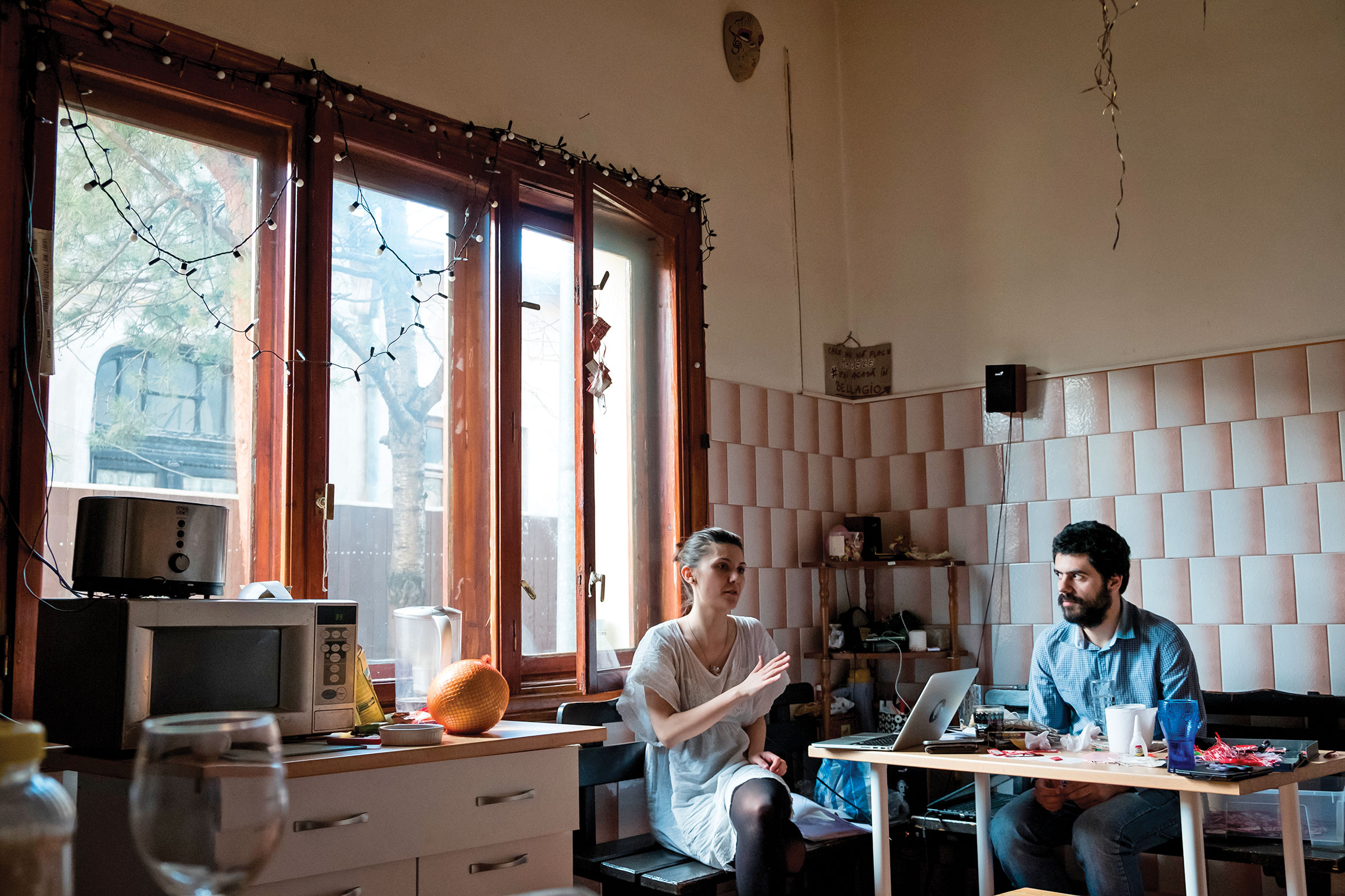
Members of Casa Jurnalistului, an independent journalists’ group that investigates government corruption, hang out in the kitchen of their collective house in Bucharest.
It seemed that the press, the NGOs, and the democratic opposition were all too fresh to have become stagnant and jaded—the journalists I met were immensely proud to be doing hard-hitting journalism and supported one another like a collective, and they seemed to really enjoy chasing the powerful and hounding the politicians. The NGO offices looked like DIY punk spaces—one Soros-funded outfit had a handwritten sign outside the door. My translator, Matei Barbulescu, lived and worked at a Patreon-funded journalist collective called Casa Jurnalistului, set back in a gritty neighborhood where Roma manele music blared day and night. Vlad Ursulean, a rakish young journalist, had started it in 2012 in a squat. He and his friends slowly built up an audience with a guerrilla-video-and-social-media approach, coupling live reporting from protests with hard-hitting multi-part investigations. They also published immersive long-form travel journalism, like traveling with refugees from Turkey and walking the Black Sea coast. In this way, Casa Jurnalistului slowly built up a sterling reputation and a loyal audience of subscribers, and then found a run-down seven-bedroom house and moved in, raising more donations with crazy dance parties in the basement and selling holiday ornaments at a craft market. “We were upset that Romanian journalists sold themselves so cheaply,” the 29-year-old Ursulean told me, “so we decided to sell ourselves even cheaper.” With the donations, the collective set up a fellowship program, where aspiring young journalists are given a bedroom in the house for nine months, a stipend, and a general sense of community, as well as the skills to edit print and video.
Casa Jurnalistului is a crumbling, beer-strewn mansion with a backyard for grilling, a bunker basement, and a window-to-window top-floor newsroom. The credo of Casa is everyone does everything—all the journalists are also editors, learn to edit and shoot video, and report with Facebook Live. In this way, they produce a wide array of high-quality content. One young woman named Liana Fermesanu, who sat outside on a spring day making ornaments, was working on an exposé about the country’s psychiatric hospital system, and another named Stefania Matache was doing an immersive report about rights and repression in Bucharest’s trans community.
Working one evening in the newsroom, which is open to the city’s independent journalists, I had the privilege of witnessing a student intern, who had showed up at the house with the dream of becoming a journalist, get assigned her first story by one of the members of the collective. She sat at her desk with a half-drunk tall can of beer and threw up her hands and shouted, “Yay! Yay! Yay! I got a story! I got a story!”
Ursulean told me, “Most of my job these days is refusing money. From corporations, politicians, oligarchs, other newspapers… They realize they need new journalism, and now they’re trying to throw money at us.” I asked him why they didn’t just take it, and he demurred. “It’s dirty money,” he said. “The only clean money comes from readers who say, ‘Hey, this story had an impact on my life, and I want to give some money to help change the life of someone else.’” For years, Ursulean had worked in the journalistic mainstream before giving up and stepping outside the system. He came away from a brief residency at the New England Center for Investigative Reporting, where he did a story on fracking in Eastern Europe with the impression that they could do their own thing better in Bucharest.
Several of Casa’s big investigations have shone a bright light on Romania’s troubled and corrupt medical system. A three-part long-form investigation by Luiza Vasiliu into Romania’s most famous doctor—who had been accused of doing experimental and abusive surgeries on children—helped lead to his arrest and upcoming trial. Ten years ago, I had seen the unrelentingly grim film The Death of Mr. Lazarescu, where an elderly pensioner goes to the hospital with minor complaints and ends up in an Inferno-like descent through the Romanian medical system that leads to his misdiagnosis and death by malpractice surgery. Being in Romania, aspects of the fiction didn’t seem too far from the reality. “We have a joke in Romania,” Barbulescu, my translator, quipped. “Go into the hospital with a small issue and come out dead.”
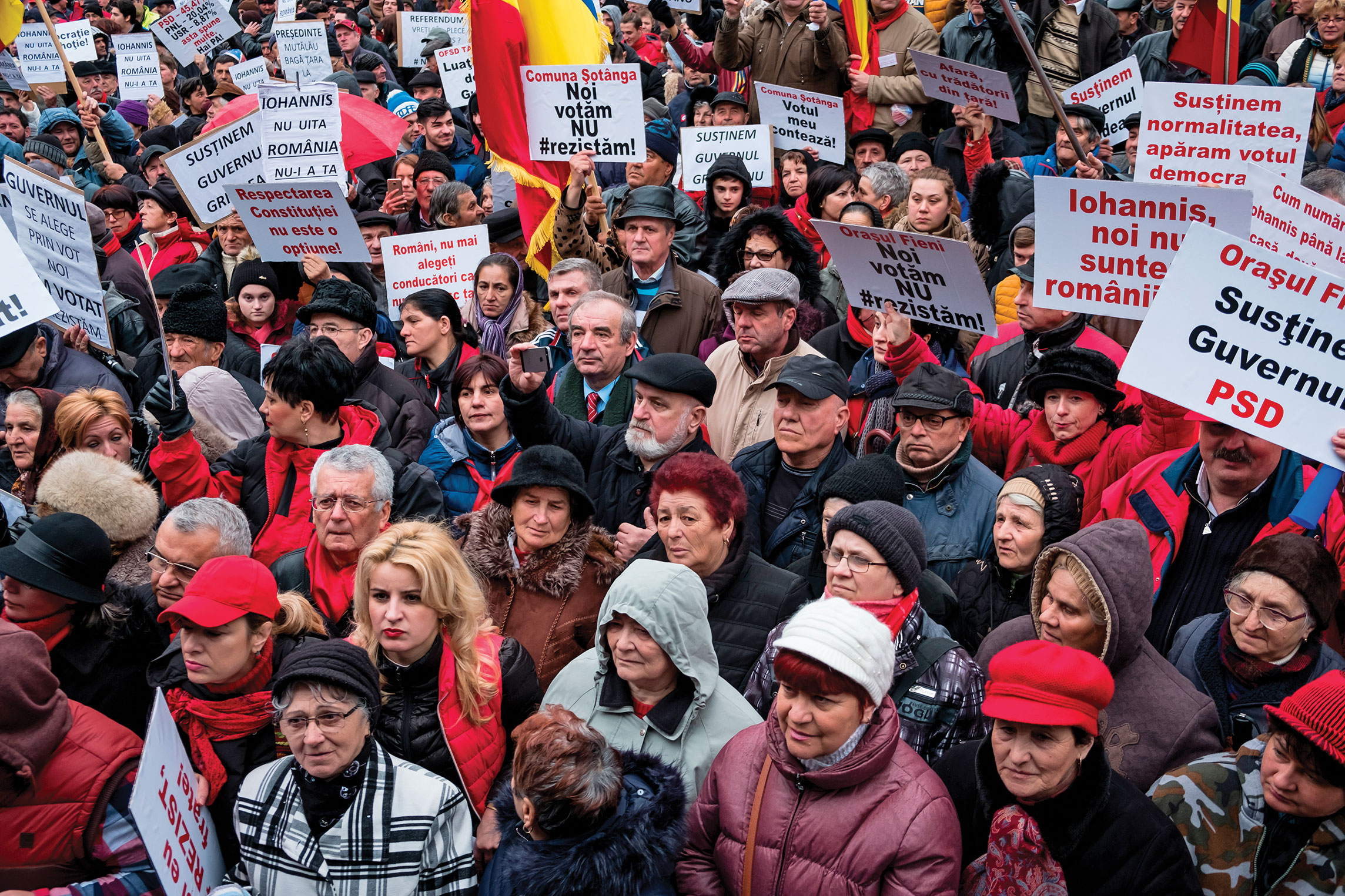
In Târgoviște, PSD supporters rally for Prime Minister Grindeanu.
Late one night, I was discreetly ushered through the grounds of Bucharest’s Colentina Hospital to the basement office of a young neurosurgeon named Gobej Ionut. A cheery man with black hair just beginning to gray, Ionut had recently come into the public view after blowing the whistle on the hospital’s new administrator, who had cut overtime pay and told staff, “We don’t care about the patients.” Ionut had made a Facebook post about the incident, asking for volunteer doctors to help out with a particularly long and complex surgery. The public hospital system is free but is eaten through with corruption and politicized managerial appointments. At the entrance of his department was emblazoned an anti-bribery ad that read HEALTH DOESN’T HAVE A PRICE! ROMANIA HAS PROFESSIONAL AND HONEST MEDICS! “I don’t judge my colleagues who take informal payments,” Ionut told me. “I have a salary of about 800 euros a month. The salaries are very low. And in this situation, where you have no compensation for people who work after 3 PM, the usual method is to take payment from the patient, pool it between the staff, and everything is OK,” he said, laughing sadly.
But Ionut’s admirable stand against bribery in his department had caused some problems. “I’m not going to say we’re the only department in the public hospital system that doesn’t take bribes… but there aren’t many like us. We are an exception. It’s a difficult thing to solve between us and our colleagues. They feel like we’re breaking the market.” The bribery in the public system is so ingrained that almost all of Ionut’s patients ply him with wads of cash at consultation appointments and become enraged when he refuses their money. As we continued to chat, Ionut seemed to become less and less certain of the exemplary, bribe-free neurosurgery department he had built. “I was surprised how difficult it was to get my team to agree to this condition.” As we finished our interview and prepared to go on a tour of the building, he admitted, “To be honest, I’m not 100 percent sure my staff doesn’t accept informal payments. But what I tell everyone is this: If I see one patient being ignored for any reason, I’ll do everything I can to make that person leave the team.”

Night after night, the protests continued, attracting between 500 and 5,000 young, mostly middle-class urbanites decrying the pervasive corruption in the bureaucracy and medical system and the PSD government. Outside of Bucharest, I found a completely different world. In the countryside, 40 percent of Romanians still lack indoor plumbing and around 40 percent of young people nationwide are “functionally illiterate,” according to a study from the Centre for Educational Evaluation and Analysis.
One drizzly morning, I drove out to a pro-government rally in Târgoviste, a provincial city two hours from Bucharest where Ceausescu and his wife were executed in 1989. The provincial cities are PSD strongholds, with a party office with the red rose at the center of every town. More than 5,000 attendees wearing red scarves, many from Târgoviste but others bused in from all over Romania, poured in for a rally downtown. If Victory Square was the protest of the urbanite, this was the rally of the provincial working class—men, with sallow faces and Soviet-style sheepskin hats, blared air horns and vuzuvuelas, chanting, “P.S.D., P.S.D.!” The rowdy ambience was heightened by the national anthem and techno remixes of Beethoven’s “Ode to Joy.” It reminded me of a cross between a Teamsters rally and a European soccer match.
One after another, PSD officials in red jumpsuits took the stage, lathering up the crowd: “Good morning, friends! We support the government! It’s a government that governs for Romania and not foreigners! Our adversaries don’t know how to lose!” After the rally, the huge crowd made a two-hour march in the rain around the city. People in crumbling high-rise apartments leaned from balconies dangling red scarves. An elementary school teacher told me that the PSD is loved because it increases salaries and “thinks about the masses.” Afterward, the hard chants of “P.S.D., P.S.D!” ringing in my ears, I wondered if I had been duped by the people in Victory Square—that if it was the iPhone urbanites who were the actual reactionaries, so enchanted by modernization and Europe that they had neoliberal Stockholm syndrome.
It made me think of what Sorin Cucerai, the philosopher, had told me about 1989: “The protest I took part in on December 21, 1989, was the protest of the urban elite. The next day, the industrial workers in Bucharest went out on a general strike. Ceausescu would have had no problem shooting me down as an ‘anti-revolutionary,’ ‘criminal element,’ but he couldn’t shoot the workers, because he was a Communist. So he tried to flee. The general strike was really the more successful protest. But if you ask people—if you ask me—the first thought is, I am the true protester because I was there first, and Ceausescu was willing to shoot me… You have a gap between these two forces that took Ceausescu down. The urban elite group tended to be more pro-democratic and pro-Western and voted with the newly formed liberal parties, while the working-class group voted for National Salvation Front [the party that came to dominate post-Communist Romania]. For the last 27 years, we have had basically two countries ignoring each other or hating each other.”

Since 2015, as many as 600,000 people nationwide have turned out for demonstrations against the Romanian government, like these protesters in Bucharest in January 2017.
Where the opposition will go or what they want remains unclear. They don’t want to bring down the democratically elected government. They talk about being educated European people in the 21st century, about wanting “honest people” in government to replace the present corrupt political class. They’re chasing the phantom of “being European” but are unwilling to admit to themselves that the EU and the US are no longer the rocks of Gibraltar that they used to be. More than wanting anything in particular or having a concrete political vision, it’s a movement stretching its wings, still testing the limits of Romania’s democracy.
On one of my last Sundays in town, 5,000 people wielding iPhones arranged themselves into a human EU flag—it seemed a Bat-signal in the darkness, a cry for help that would elicit little more than a shrug in Brussels. Marinescu was there with some friends. In the previous days, I had heard over and over about a USR scandal where a party representative had made a Facebook post telling people to call the police on homeless people, enraging the party’s more liberal supporters. The post was retracted immediately, and a statement of apology had been issued, but when I asked Marinescu, he just sighed, saying, “These are mistakes because the party is pretty new, and it’s getting big, and it’s very hard to control it… It’s a movement, and we’re trying to transform it into a party, and it’s not exactly easy.”
One skeptical left voice in the wilderness I met was the award-winning novelist Vasile Ernu. “This anti-corruption fight sounds like you’re going to win everything,” he told me. “Everything will be great if you fulfill this movement. But nobody knows what anti-corruption really means.” Ernu, wizened and in his 40s, wearing a red scarf and black Lenin cap, had gone to Victory Square at the beginning of the movement but had gotten disillusioned by the arrival of bankers and liberals who invested all their hopes in the DNA, not unlike the idea some liberals in the US have that Obama is going to come back and save them from Trump. “It’s absurd for me to hear bankers screaming against corruption.”
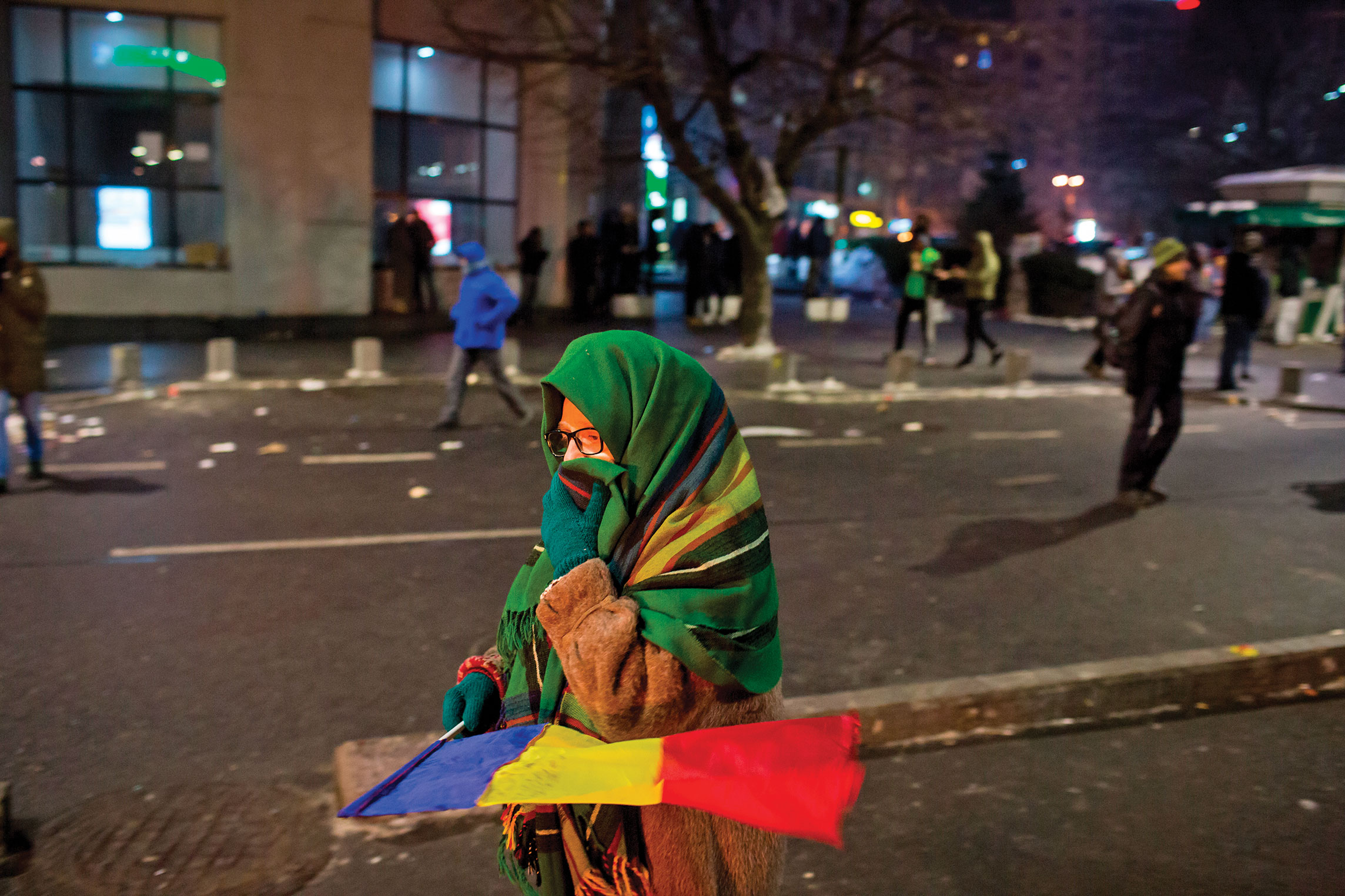
Ernu believed the anti-corruption movement lacked the will to address poverty and inequality. “My basic opinion is that we live in a country dominated by conservative ideology. All the parties have built their programs around foreign investment and the middle class. The parties that represent the middle class have a new type of discourse that is very attractive—the fight against corruption. But it’s strange how anti-corruption only fights against parties, very rarely against big capital or the corporations. The DNA is not touching the One Percent, the real money.”
Ernu said he had been called a “PSD supporter” for his critiques of the movement. “The PSD is a conservative party. They fight LGBT rights; they’re very populist, very nationalist, very pro-business. At the same time, they’re the only party that has never humiliated poor people. Because the technocrats are patronizing idiots. They say you’re lazy, you’re drinking—and then wonder why they get no votes from the poor people.”
As I prepared to leave Bucharest, a senator from the PSD reintroduced the corruption amnesty legislation in parliament. The people I spoke to were split on whether a parliamentary passage of the corruption amnesty would lead to even bigger street protests or a slow, seeping death of the protest movement. But the Sunday night after I left, the spring weather finally arrived, and 10,000 people showed up in the square. For the first time since January, enormous crowds marched through town, stopping and yelling in front of Ceausescu’s monumental Palace of Parliament, finally ending at the nondescript DNA building, where they shouted, “DNA don’t give in, don’t bow out, we are on your side!”
UPDATE 5/5/17: Due to a reporting error, the author’s translator’s name was spelled incorrectly. It’s Barbulescu, not Barbelescu.
UPDATE 5/5/17: Due to a reporting error, Serban Marinescu was misidentified as USR’s chief strategist. He is a leading member of USR’s parliamentary staff, now running for president of the party.

